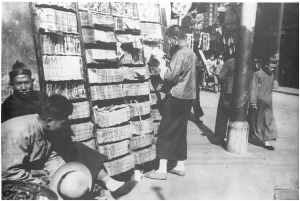Speaker: Professor Joan Judge (Department of History, York University)

Abstract:
Central to the political, literary, and social revolutions of the 20th century was the figure of the masses: a collective that was urgently addressed, repeatedly invoked, and broadly understood to be in need of uplift and education in the service of the “New China.” What was most actively occluded in these imaginings was the actual lifeworld of those interpellated to become the “new” masses: their beliefs, texts, and modes of thinking which were systematically relegated to the dustbin of superstitious and backward “Old China.”
This presentation is an effort to recover something of this neglected lifeworld through an ethnography of as yet little explored modes of knowing and practices of reading. It searches for the common reader in two distinct places: the genre of daily-use encyclopedias known as “complete compendia of myriad treasures” (wanbao quanshu 萬寶全書) and the street side bookstalls which proffered avidly consumed—and widely condemned—cheap reading material. It asks: who were the common readers in the late 19th through the early 20th centuries? what categories did they think with? what information did they consider useful? and where did they turn to find it? The premise of the presentation is that alternate epistemologies, unorthodox systems of organizing information, and divergent ways of interacting with the natural world are inherently valid topics of inquiry. Critical to fully understanding a knowledge culture, they also push us to question the articulation between the realm of common knowledge and the spheres of politically prescribed and scientifically grounded new learning.
About the Speaker:
Joan Judge is Professor in the Department of History at York University in Toronto. She is the author of Republican Lens: Gender, Visuality, and Experience in the Early Chinese Periodical Press (University of California Press, 2015), The Precious Raft of History: The Past, the West, and the Woman Question in China (Stanford University Press, 2008), and Print and Politics: ‘Shibao’ and the Culture of Reform in Late Qing China (Stanford University Press, 1996). She is also co-editor of Women and the Periodical Press in China’s Global Twentieth Century: A Space of Their Own? (Cambridge University Press, forthcoming) and Beyond Exemplar Tales: Women’s Biography in Chinese History (Berkeley: Global, Area, and International Archive/University of California Press, 2011). She has been involved in an ongoing digital humanities project on the early Chinese periodical press and is currently engaged in an SSHRC-funded project with the working title “Quotidian Concerns: Everyday Knowledge and the Rise of the Common Reader in China, 1870-1949.”
Sponsors: CCK Foundation Inter-University Centre for Sinology, Department of Asian Studies, and Centre for Chinese Research